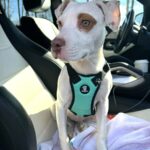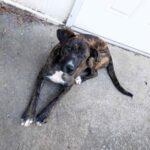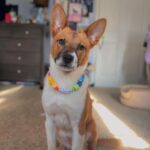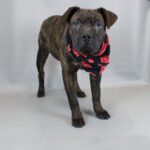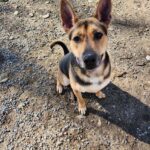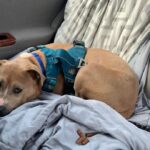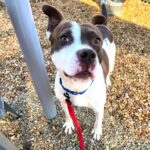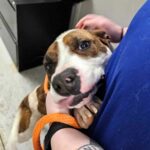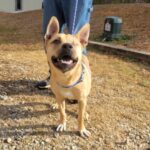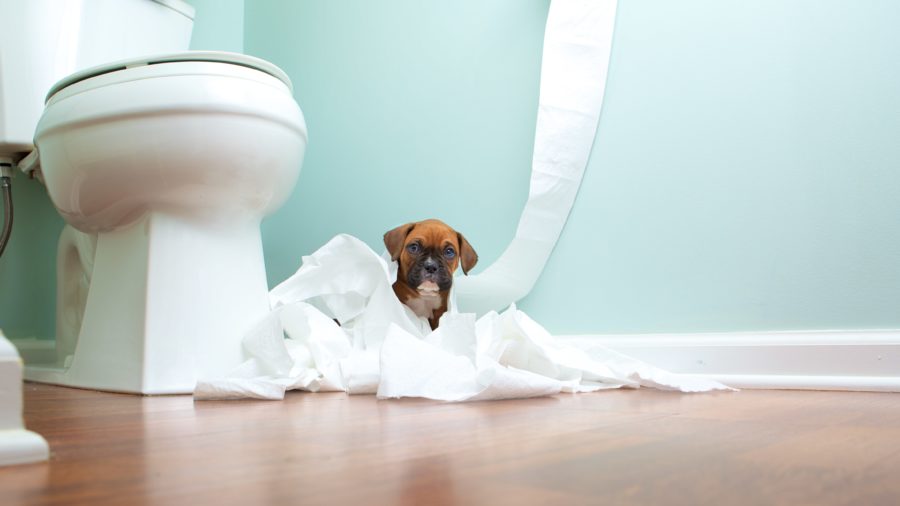
Source: Rhonda Bilodeau | Vermont Dog Pack
RULING OUT MEDICAL ISSUES
If you are having trouble house training your dog, the very first thing you should do is eliminate the possibility of a medical issue by having a urinalysis and fecal culture done at your veterinarian’s office. If they are urinating frequently in small amounts or straining to pee or have diarrhea there is a chance that they are battling a urinary tract infection, have parasites, or have another underlying medical issue. This possibility should be eliminated prior to assuming it is a behavioral issue.
WHY DO RESCUE DOGS HAVE ACCIDENTS IN THE HOUSE?
Your new rescue, regardless if they dog may potentially have accidents in the house from a short period of time to a long period of time depending on how much stress they’re feeling. This is regardless if they’re housebroken already or not. Dogs don’t eliminate in the house because of ‘spite’. They eliminate because they loose control over their bladder due to stress. This stress can come from feeling alone, abandoned or scared without their people around. Some dogs rely heavily on people to relax them and when the things that leaves them comforts them they can often times spiral out of control into an anxious panic.
ADJUSTMENT PERIOD
Many rescue dogs will go through a very short adjustment period as they feel more confident in their new home they’ll have less accidents. Many rescue dogs also need to know that going in the house is NOT ok. They may have been give access to potty in the house through wee wee pads or not been taught not to eliminate in the house. They may need to learn to relieve themselves outside and know that eliminating inside will not be acceptable in their new home.
NEVER RUB YOUR DOGS NOSE IN THE AREA THEY ELIMINATED
Instead say a sharp “No!” and bring them outside immediately to eliminate. Even better put your dogs elimination on cue outside by saying “go potty” repeatedly and when they do potty say “good dog” and give them a calm pet or treat them calmly and then let them hang out outside for a short while after (so they don’t think eliminating means the end of the outing or they’ll never want to eliminate) and then bring them in.
HOW TO POTTY TRAIN YOUR NEW RESCUE DOG
For a dog that just needs to be taught the basics of house training you should begin with having a designated potty spot outside that you take them to EVERY time you take them outside. As with any training experience, be sure to bring plenty of treats with you. Combine this with a verbal command such as “Go potty” and once they have gone you can give them lots of praise and be sure to give them play time. If a dog learns that as soon as they go potty they immediately get brought back inside, then they will delay going potty to get more outside time with you. If the dog does not relieve itself within a few minutes, bring them back inside and
either crate them or keep them on a leash attached to your hip so that they can’t sneak off and go potty in the house. After 30 minutes take them back outside and try again. Repeat these steps until the dog has gone potty in the designated area. Until they have become fully housebroken they should be restricted from having full access to your home by gating off doorways so you can keep a close eye on them at all times.
CONTROL WATER AND FOOD INTAKE
Potty training is about creating a consistent schedule of food, water, activity and a controlled environment to prevent a dog from eliminating inside. The goal is to manipulate their daily routine so they have plenty of opportunities to succeed eliminating outdoors. If we keep things consistent and control / monitor food, water, activity, etc. we can easily predict and influence when a dog will need to eliminate and assure it happens successfully outside.
THE POTTY TRAINING RULE
When you think your dog needs to eliminate and you take them outside to eliminate and they don’t eliminate, always put your dog back in the crate when you come inside or tie them up to you so you can watch their signals should they try to eliminate inside instead (as some dogs prefer to eliminate inside instead). Let them back out again after 20 min and try to get them to eliminate. Repeat the steps above if they don’t eliminate and only give them free access to the house only if they have eliminated.
TRACK THE SCHEDULE
Writing down their elimination schedule can help assure you that they needed to eliminate but they may have become too distracted (as many puppies and overly excitable dogs do outside). Pick up water at 7pm to eliminate overnight accidents and don’t leave water in their crate. Limiting their water intake in the morning assures you they can hold it for quite some time. When in doubt take them out!
Another good rule is to let them outside to eliminate after any activity as it stimulates a dogs system to have to go potty. Most accidents occur after play time or anytime they’ve drank a bunch of water.
Make sure to take your dog out before they ever show distress signals as you don’t want to your dog to start training you and make noises each time they feel like they need to go. They may just start faking it. You can prevent this by always being proactive and taking them out way before they feel the need to go.
WEE WEE PADS
We never use wee wee pads because it sends mixed messages to your dog telling them that sometimes they can go inside and sometimes they can’t. Make it clear you never want your dog eliminating inside the house. Using wee wee pads also makes it harder to wean them off the wee wee pads.
PUPPY POTTY FORMULA
Age In Months + 1 = Number of Hours Between Potty Breaks! Be prepared to do frequent potty breaks when bringing a young dog into your family so you’re
not asking them to hold it beyond what they’re capable of.
PUPPY POTTY TRAINING
For puppies it is important that you realize that they have much smaller bladders and cannot be expected to hold it for hours on end. The general rule of thumb is that puppies can hold it for one hour per month in age. There are also some basic rules that allow you to predict when your puppy will need to potty. You should take your puppy out after they have eaten, finished a play session, or just woke up from a nap. You should also take them out at least once during the night.
Make sure you get someone to let your puppy out during the day (no more than 4 hours). Do not use pee pads unless absolutely necessary since many dogs that start on pee pads have a hard time transitioning from the mentality of ‘it’s sometimes okay to pee inside’ to it’s never ok. If you do have to be gone for longer than the pup can be expected to hold it you should not use a crate. Instead, gate them off in a room (preferably not carpeted) and free of debris that they can chew on and get hurt or poisoned (i.e. electrical cords, plants, etc.) and put down some puppy pee pads for them to go on. The last thing you want to do is crate a puppy for so long that you force them to eliminate in their crate. If they get into this habit, it will be a very difficult one to break.



